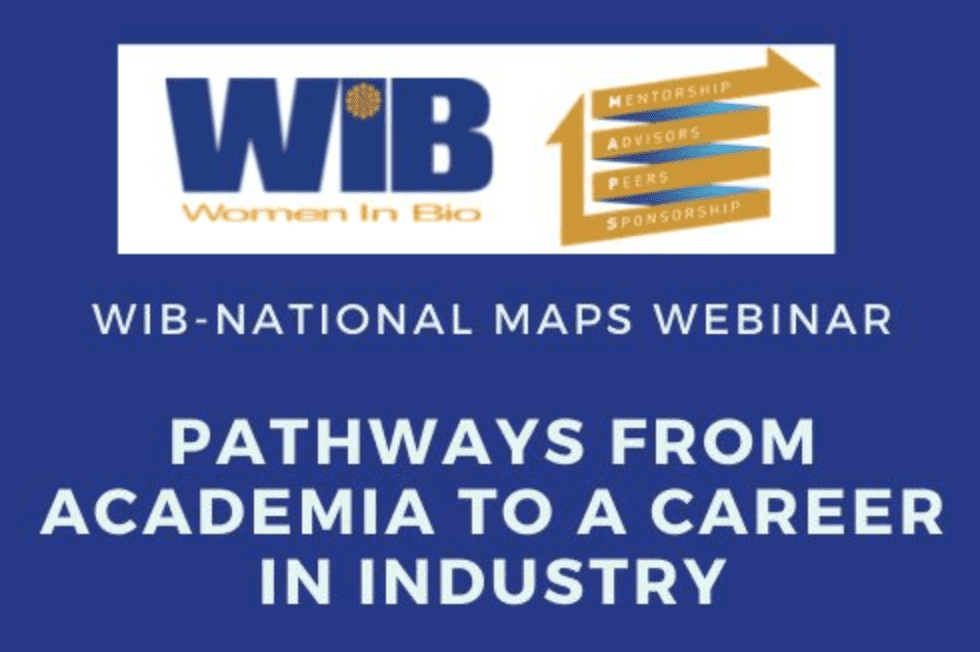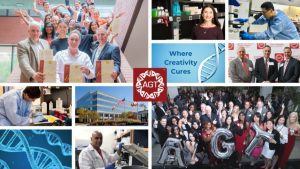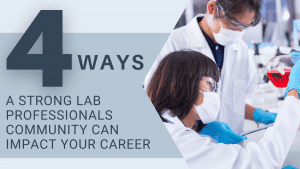
Women in Bio Prepares Researchers for Career Transitions to Industry
Women In Bio is an organization of professionals committed to promoting women’s careers, leadership, and entrepreneurship in the life sciences. Since 2002, this organization has served as a community representing one of the fastest-growing and most influential organizations for women in life sciences. Women In Bio currently boasts 13 chapters throughout North America, led by more than 600 volunteers and a membership base of over 3,000. WIB members belong to biotech and pharma companies, universities and institutes, law and accounting firms, marketing, PR firms, CROs, and CMOs, among other careers. Women in Bio-Capital Region is the local chapter for professionals in the BioHealth Capital Region.
One of the organization’s activities is hosting host events and webinars to prepare women for different career opportunities and career transitions. For example, a recent webinar, “Pathways from Academia to a Career in Industry,” touched on how one can make a career transition from academia to industry.
With a growing focus on translating research for collective benefit, there is increasing recognition of how industry and academia are intertwined. Besides taking the bench skills to the bedside, a career in industry also serves as a place where many may be better suited. Unfortunately, however, the skillsets of most academics are often not aligned with the needs of the industry. This webinar gave STEM academics insights into the fundamental differences and similarities between academia and industry and the best way to prepare themselves for a successful career in industry.
Here are some of the key takeaways from the webinar which will interest researchers in the BHCR.
From Bench to Where? Opportunities for Academics.
If you are contemplating leaving academia, the first step is to be aware of the different opportunities and careers you could pursue beyond R&D. Remember, even if your training is entirely scientific, you can enter the clinical, commercial, business development, investment, and venture capital, regulatory, and consulting spaces in life sciences. If you are unsure about a particular field, the best solution would be to talk to current professionals in those careers.
By doing this, you will gain practical insight into the role and whether it might be a good fit for you. Next, contemplate what type of organization you might be interested in working for. Big company training might help you develop as a well-rounded professional. However, if you have a more entrepreneurial mindset, there is good value in entering a smaller growth-stage company.
After you hone in what role you are interested in, determine if there are any skillsets or technical experiences you should pursue to make you a competitive job applicant. Depending on your background and current role, you might need to be strategic about transitioning to a particular career. In addition, remember that technical skills are only a part of a robust job application. The most successful professionals have excellent soft skills, including team building, communication, creative thinking, and interpersonal skills. As you begin your job search, seek opportunities to develop and hone these skills, and make sure they reflect in your cover letter and conversations with others.
Want to Start the Transition? Leverage Networking.
At times, getting your foot in industry can depend on your contacts in a sector or particular company. Networking to find a new job can also give you access to opportunities that you may not find through an online job search. For example, many positions are not listed on company websites but are shared only internally or through networking. This means that you need to regularly communicate with those in your network, so they know your skills and experience, trust you, and see when you are searching for a job.
If you want to expand your network, the best place is to start is your existing network. When contacting the people in your network, let them know that you’re looking for a job. Be specific about what kind of work you’re looking for and ask them if they have any information or know anyone in a relevant field. You may be surprised by who they know, and most people will be happy to connect you to newer connections.
You can also reach out to professionals on your own through networking events, professional events, webinars, and LinkedIn. Before attending a particular event (for example, a research conference), you should research the people you are interested in networking with. If the networking event is a conference, you could also contact them beforehand and ask to meet over coffee. While approaching someone for an informational interview, be honest and direct but not ask for a job. Say, ‘I’m contemplating making a career transition, and I want to make an informed decision. Please can I ask you a few questions about your experience in industry/this company?’”
Before an informational interview, it is a good idea to prepare a 2-3 minute elevator pitch about yourself- it will help the other person understand more about you. Make sure the elevator pitch is relevant to the role you are interested in. Use each networking conversation as a springboard for future networking opportunities. For example, at the end of a conversation, you could say, “You raised an excellent point about xyz? Do you mind connecting me to someone who could talk to me about this?.”
Even after you secure a new position, continue to develop your networking skills – it will be a valuable tool that will serve you throughout your career life.
Develop Your Personal Brand and Tailor Your Resume.
Having a personal brand can provide you many benefits when finding a new job and staying relevant in your career. Your brand is essentially marketing yourself and your career expertise to others. It should showcase your story- your passions, your accomplishments, and future potential. This can be reflected in your LinkedIn activity, cover letter, and elevator pitch. Like a business brand, a personal brand not only tells your story, it sets the stage for future growth and will advance you towards your career success. As a result, many employers search online to investigate their candidates.
You should individually tailor your resume and cover letter per the job you are applying for. The first half of the first page of your resume is critical. It should hold all the key points you want to highlight concerning the position in question. Most recruiters will decide about the relevancy of the candidate from this first half itself.
In the era of COVID-19, job searching and hiring are different as many company employees are still working remotely. Therefore, job seekers should be aware of how remote technology may impact their personal brand. For example, many job interviews might occur via an online conferencing platform or simply over the phone. This will require you to express yourself without relying on nonverbal cues such as facial expressions or hand motions.
Assessing Opportunities and Companies.
Your assessment of companies should begin during your networking stage. When you are talking to someone currently employed at a company you are interested in, understand the company structure and work culture and determine if the organization is the right fit for you. Understand whether a particular opportunity aligns well with your long-term goals and helps you develop the skills to advance in your professional journey.
You can watch the complete webinar here.
In addition, you can check out the list of upcoming WIB events here. One does not have to be a member to attend WIB events. However, there are many perks of becoming a member, including member pricing on occasions, the ability to participate in MAPs groups, access to free webinars from other WIB chapters, and the ability to take on a leadership role.
Women in Bio-Capital Region is the local chapter for many professionals in the BioHealth Capital Region. Right now, you can save $20.21 on a One-Year WIB Membership using the promo code: Inclusion2021 (offer expires October 1, 2021)
Are you interested in a leadership role or getting involved with WIB as a volunteer? Learn more about WIB committees and leadership opportunities here and get in touch at [email protected]!
- About the Author
- Latest Posts
Nivedita recently received her Ph.D. from the University of Maryland, Baltimore in biochemistry and molecular biology and an MS in law (patent law). She is passionate about science writing and communication, and is actively involved with the Maryland biotech scene through her work with Women in Bio- Capital Region , AWIS (Baltimore Chapter) and BioBuzz.






